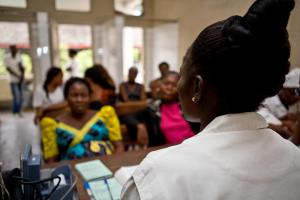Helping to break mental health care barriers in Kenya
Nairobi – In a previous stint as a chemistry teacher Dr Gladys Mwiti could not help but notice flagging performance among her students. She would later discover that the underachievement was largely due to unresolved trauma from poverty, domestic violence and abuse. The now retrained Kenyan psychologist is running an organization that provides mental health care. She discusses the barriers to mental health services and how to support those who need help, especially in underserved communities.
Why is access to mental health services so critical?
Access to mental health services is important because it is one of the parts that make a whole individual. We have the physical, which often gets a lot of attention, whether it is illness, hunger, or access to shelter. And we have economic health – education, employment and so on. Then we have spiritual health.
But mental health is a neglected field, and when you neglect mental health then you neglect the whole person. So, the person walks with a “limp” in life.
There has been an evolution of awareness of mental health over the years because we have come from a position where people did not realize that mental health is important. We evolved from almost nothing in training to now many universities offering psychology training.
What are some of the barriers to mental health care?
The main challenge is poor diagnosis and lack of service provision because although we have a huge need, the country has only 100 psychiatrists. Although there are no official figures, I estimate that Kenya must have at least 400 psychologists, but because it is not a recognized field, practitioners are not being connected to the need.
We have psychologists being trained, but because there is no structure, psychologists are poorly employed and end up volunteering their time. The people who end up having the resources to run rehabilitation centres are psychiatrists whose training is in mental illness. Psychologists can do a lot in prevention before people become mentally ill. The skills people learn through recovery through therapy translate into other parts of their lives. They work better, they have better relationships at home, they function well in the community, they look for social support and build on it. That is the value of psychology.
What are the common mental health challenges people are facing?
Well, “I'm not sleeping well” is the basic story, but the person is not able to work well, relationships are not good, lots of stress, abuse, and domestic violence. Others lack skills to relate well. As a trauma centre, we also see many psychological trauma cases.
COVID-19 has brought with it more anxiety, isolation, depression, increased violence and sexual abuse. Adolescent pregnancy rates increased. People lost employment, and economic depression and poverty got worse. Then there is traumatic stress from the grief and the loss.
People have what we call layers of trauma. When trauma is not addressed, it morphs into physical illness. We have doctors treating opportunistic illnesses, even cancer, that is related to traumatic stress. Then there is stigma. Because of ignorance and shame, many people hide their problems. They may end up self-medicating, leading to addiction.
How do you contribute to overcoming these challenges?
I feel that the best way to do mental health is going to the community. Many years ago I decided that alone. I could not do much. So I developed a “funnel” model which gives the power to the people, especially after calamities. We begin wide with community psychoeducation and then we narrow down into the specific issues facing the community. Trained psychologists work with counsellors in the community to adopt what the World Health Organization calls the task shifting model, in which multidisciplinary teams are trained to deal with the trauma that happens in their community. This lowers stigma and creates mutual support in times of crisis.
Every community should have at least one psychologist so that people can be referred to them. I’m hoping Kenya can undertake a task shifting model where you are able to mobilize skilled people to offer the best where they are, for example, a teacher dealing with an abusive home environment of a student.
I use a lot of guidance from the WHO. But we need development organizations to come on board and fund mental health, not just physical health. They need to recognize the trauma associated with poor access to water, or food, and other challenges to mental wellbeing. Mental health is not taken seriously enough.
Communications & Social Mobilisation
Tel: +254 722509403
Cell: +254 710 149489
Email: mwakishaj [at] who.int (mwakishaj[at]who[dot]int)
Media Relations Officer
WHO Regional Office for Africa
Email: dalalm [at] who.int (dalalm[at]who[dot]int)
Tel: +254 703 245 761 (WhatsApp)



